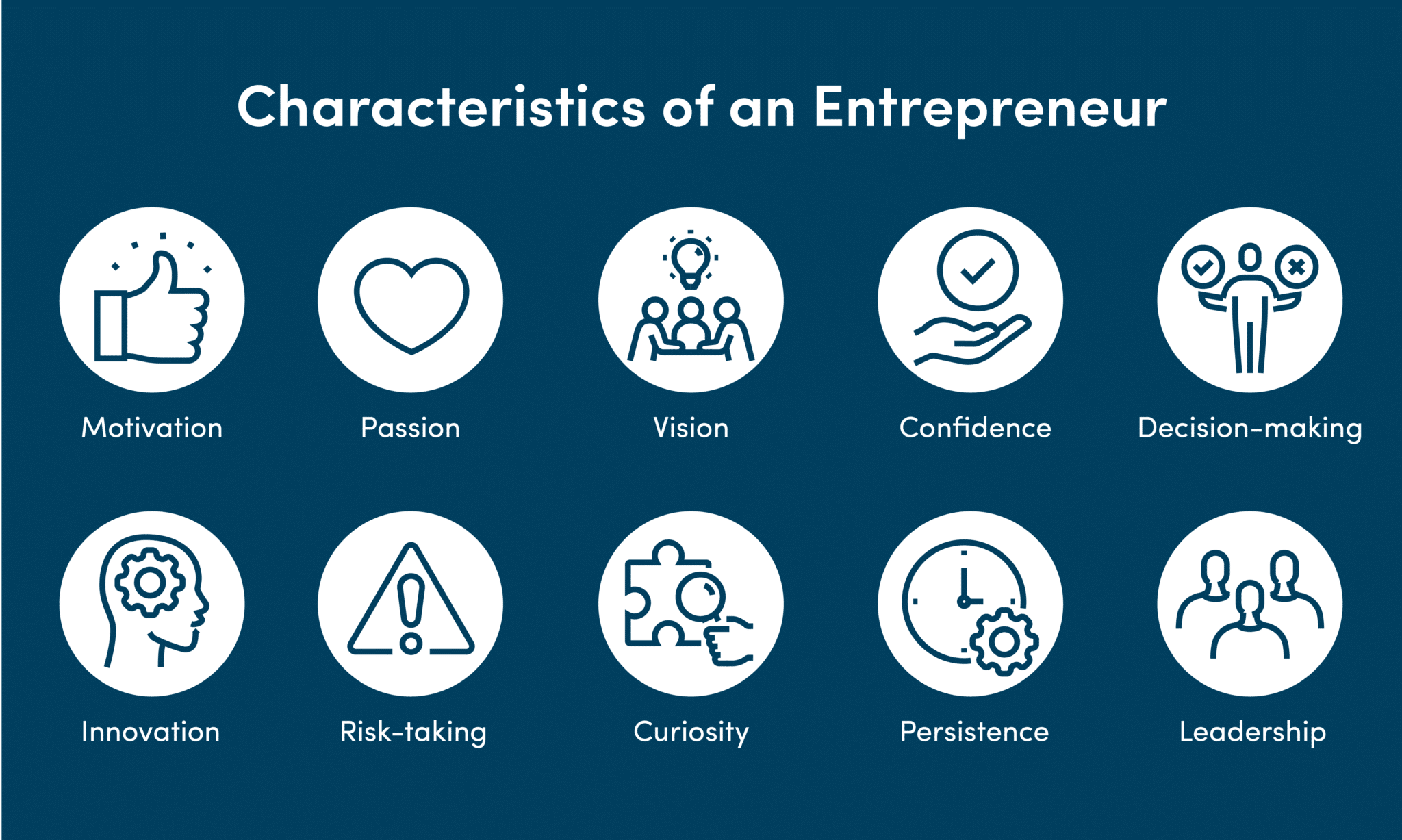Entrepreneurship is more than just having a great idea; it’s about embodying a unique blend of traits that turn visions into reality. In this blog, we’ll explore what entrepreneurship is, what defines an entrepreneur, and the key characteristics that lead to entrepreneurial success.
What is Entrepreneurship?
Entrepreneurship is the process of establishing, managing, and scaling a business. This journey involves not only the creation of a business unit (referred to as an enterprise) but also the expansion of employment opportunities. Entrepreneurs leverage innovation, skills, and vision to develop new products, services, or ideas that fulfill market demands and create value.
Who is an Entrepreneur?
An entrepreneur is an individual with the ability and desire to start and manage a business venture, taking on financial risks to achieve profits. Key functions of an entrepreneur include:
- Innovation: Identifying opportunities and creating new products or services.
- Risk-taking: Embracing financial and operational risks in pursuit of growth.
- Resource Management: Efficiently managing capital, labor, and technology.
- Decision-making: Making critical choices that affect the business.
- Leadership: Motivating teams to achieve common goals.
- Vision and Strategy: Setting a clear direction and strategic plan to realize business objectives.
Characteristics of Successful Entrepreneurs
While each entrepreneur is unique, several common characteristics define those who achieve success in their ventures. Here are key traits that embody an entrepreneurial mindset:
1. Vision
Every successful entrepreneurial journey begins with a clear vision. This vision serves as a guiding light for stakeholders, employees, and investors. A well-articulated mission statement outlines the organization’s objectives.
Example: Ritesh Agarwal’s vision for OYO Rooms was to standardize budget accommodations, making quality stays accessible for millions.
2. Risk Tolerance
Entrepreneurs must be comfortable with risk, understanding that starting a business involves potential failure. A calculated approach to risk can turn perceived threats into opportunities.
Example: Quitting a stable job to start a business might seem risky, but for an entrepreneur, it’s often a calculated decision rooted in confidence.
3. Innovation
Innovation is critical for entrepreneurship. It drives the creation of new products and services, allowing businesses to differentiate themselves in competitive markets.
Example: Blue Tokai Coffee Roasters innovated by sourcing beans directly from local farms, catering to the demand for high-quality coffee in India.
4. Discipline
Discipline is vital for maintaining momentum in the face of challenges. Entrepreneurs need to establish routines and remain committed to their goals, even when motivation wanes.
Example: Falguni Nayar, founder of Nykaa, exemplified discipline through thorough market research and networking, leading to Nykaa’s success.
5. Adaptability
The ability to adapt is crucial in a rapidly changing business environment. Successful entrepreneurs embrace change and view challenges as opportunities for growth.
Example: Ankit Mehta of IdeaForge pivoted from renewable energy to drones, successfully tapping into a new market.
6. Leadership
Strong leadership skills are essential for guiding teams and inspiring them towards a shared vision. Effective entrepreneurs communicate clearly and motivate their workforce.
Example: Peyush Bansal of Lenskart built a dedicated team that shared his vision of accessible eyewear, demonstrating strong leadership.
7. Creativity
Creativity fuels innovation and enables entrepreneurs to develop unique solutions to challenges. It allows them to think outside the box and differentiate their offerings.
Example: Anand Mahindra integrates sustainability into the Mahindra Group’s operations, showcasing creative entrepreneurship.
8. Curiosity
A curious mindset drives entrepreneurs to explore new possibilities and question the status quo. This trait enables them to identify unmet needs and refine their ideas.
Example: Shaka Harry’s founders recognized a gap in the Indian market for plant-based alternatives, driven by their curiosity for healthier options.
9. Passion
Passion is often the underlying force that drives entrepreneurs. It fuels their commitment to their ventures and helps them navigate the ups and downs of the entrepreneurial journey.
Example: Nisha Patel’s dedication to sustainability led her to create a successful eco-friendly clothing line, demonstrating how passion can drive business success.
Conclusion
Entrepreneurship is characterized by a blend of vision, innovation, and adaptability. These traits enable entrepreneurs to navigate challenges, seize opportunities, and create impactful businesses. If you possess some of these characteristics, you may already have what it takes to embark on your entrepreneurial journey!
